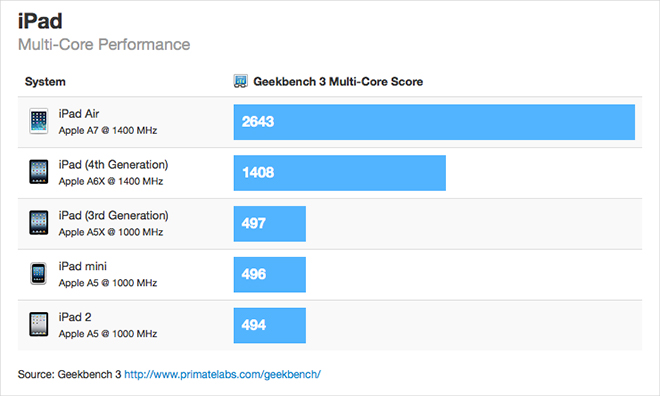Ahead of Friday's iPad Air release, performance analytics firm Primate Labs is starting to see data trickle in from its Geekbench Browser, with the tablet's A7 system on a chip showing huge performance gains over last year's iPad.
Primate Labs founder John Poole compiled the results from iPads Airs running the Geekbench 3 benchmark, and compared them to all iOS 7-compatible tablets, which includes the iPad 2, third- and fourth-generation iPad and iPad mini.
As seen above, Apple's newest iPad trounces its predecessors by a hefty margin, beating last year's fourth-generation iPad by some 87 percent in the multi-core benchmark. This is near Apple's claim that its A7 SoC offers up to twice the performance compared to last year's A6X.
Poole notes that the iPad Air is running an A7 clocked at 1.4GHz, or 100MHz faster than the same processor found in the iPhone 5s. This could be due to the iPad's larger battery capacity or larger chassis, which would provide for better thermal flexibility, or a combination of the two, he said.
While the full-size iPad has a tweaked clock speed, Poole does not expect the same for the iPad mini, which will also feature the A7 chip. Instead, he believes the machine will be in line with the iPhone 5s.
Since the third-generation iPad debuted with a Retina display in 2012, Apple has used a higher-spec processor for its tablet lineup, differentiating the custom chip by adding an "X" to its name. The most recent version, the A6X, featured an integrated quad-core GPU and higher clock speed than the iPhone's A6 version. In addition, the A6X also featured a larger SDRAM pipeline.
Finally, when compared to Apple's entry-level iPad 2, the iPad Air is over five times as fast, while costing only $100 more.
Apple's iPad Air will go on sale this Friday, with Apple Stores opening at 8 a.m. local time for the launch.



